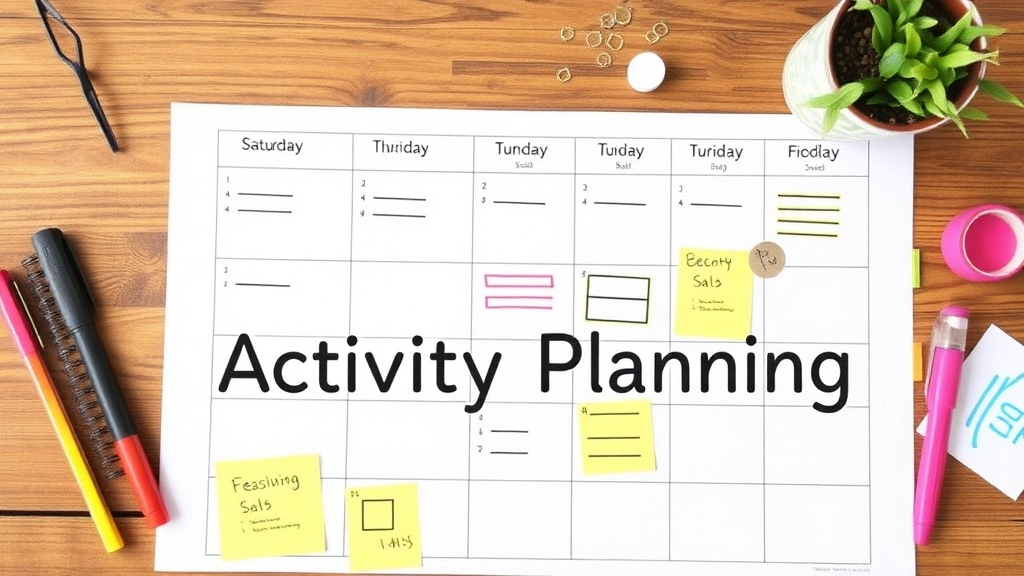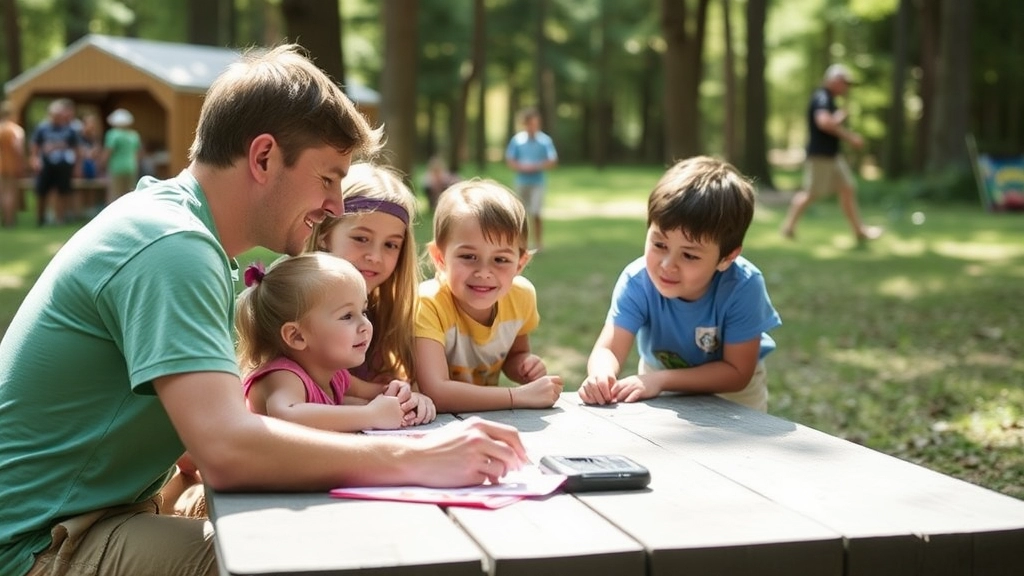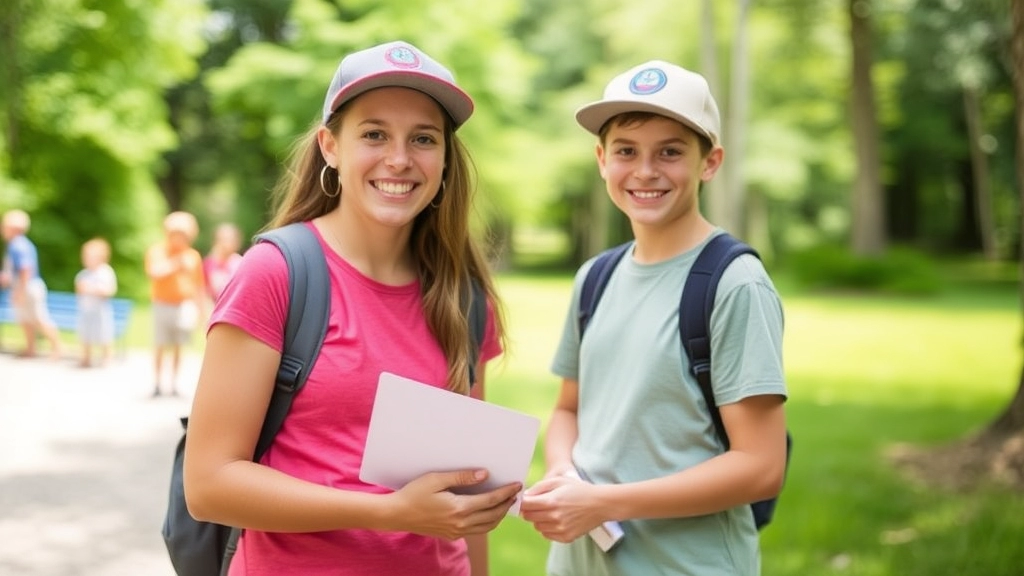Excelling as a Summer Camp Counselor
Ever wondered what it takes to excel as a summer camp counselor? Whether you’re a seasoned pro or just starting out, understanding the multifaceted role of a summer camp counselor can make all the difference. From planning daily activities to ensuring camper safety and fostering positive relationships, this article dives deep into the key responsibilities and skills you need to succeed.
Key Responsibilities and Skills
We’ll explore everything from the daily routine and activity planning to safety protocols, effective communication with campers and parents, and conflict resolution. You’ll also learn about the importance of team collaboration, leadership skills, and adapting to diverse camper needs. Plus, we’ll cover essential training and certification requirements to ensure you’re fully prepared for the job.
Getting Started
Let’s get started on making this summer unforgettable for both you and the campers!
Key Responsibilities of a Summer Camp Counselor
Ever wondered what it takes to be a summer camp counsellor? Or maybe you’re already in the game and want to up your skills? Either way, let’s dive into the nuts and bolts of what makes this role tick.
First off, what are the key responsibilities of a summer camp counsellor? It’s not just about having fun and playing games, although that’s a huge part of it. Your main job is to create a safe, engaging, and memorable experience for the campers. Here’s a breakdown:
Supervision and Safety
- Keeping an eye on the campers: You’re the first line of defence when it comes to their safety. This means constant vigilance and knowing where everyone is at all times.
- First aid and emergency response: Be ready to act in case of an emergency. This means having basic first aid skills and knowing the camp’s emergency protocols.
Activity Planning and Execution
- Daily schedules: You’ll be responsible for planning and leading activities. This includes everything from sports and arts to adventure and team-building exercises.
- Flexibility: Sometimes plans don’t go as expected. Be ready to adapt and think on your feet.
Building Relationships
- With campers: You’re not just a supervisor; you’re a role model. Build trust and rapport with the kids to create a positive environment.
- With parents: Keep them in the loop. Regular updates and open communication make a world of difference.
Conflict Resolution
- Mediating disputes: Kids will be kids. When conflicts arise, it’s your job to mediate and resolve them in a fair and effective manner.
- Problem-solving: Be a quick thinker. Whether it’s a minor squabble or a bigger issue, having a calm and strategic approach is key.
Team Collaboration
- Working with other counsellors: You’re part of a team. Effective communication and cooperation with your fellow counsellors ensure a smooth camp experience.
- Leadership: Sometimes you’ll need to take charge. Whether leading an activity or handling a crisis, strong leadership skills are crucial.
Adapting to Diverse Needs
- Inclusivity: Camps are a melting pot of different backgrounds and abilities. Adapt your approach to meet the diverse needs of all campers.
- Special needs: Be prepared to provide extra support to campers with special requirements.
Training and Certification
- Get certified: Most camps require specific certifications, like CPR and first aid. Make sure you’re up to date.
- Ongoing training: Stay sharp. Regular training sessions will keep your skills fresh and relevant.
So, why is this role so important? Because as a summer camp counsellor, you’re shaping experiences that kids will remember for a lifetime. It’s a big responsibility, but also incredibly rewarding.
Daily Routine and Activity Planning

Ever wondered how to keep a group of energetic kids engaged all day long?
Yeah, me too.
Being a summer camp counsellor is no walk in the park.
But with some solid planning, you can turn chaos into a smooth ride.
The Morning Kick-Off
First things first, mornings are crucial.
You need to set the tone for the day.
Start with a morning meeting:
- Go over the day’s schedule.
- Address any concerns or special needs.
Why?
Because it gets everyone on the same page.
Activity Blocks
Now, onto the fun stuff—activities.
Break the day into blocks:
- Morning Activities: Think sports, arts and crafts, or nature walks.
- Lunch Break: Keep it structured but relaxed.
- Afternoon Activities: More engaging stuff like team games or swimming.
Flexibility is Key
You can plan all you want, but things can go sideways.
Be ready to pivot:
- Have backup activities.
- Keep an eye on the weather.
Camper Involvement
Get the campers involved in planning.
Why? Because it gives them a sense of ownership.
How?:
- Let them vote on activities.
- Involve them in setting up.
Downtime and Free Play
Kids need downtime.
Include free play:
- It’s a great way for them to socialise.
- Gives you a breather to regroup.
Wrapping Up the Day
Finish strong.
End-of-day wrap-up:
- Recap the day’s highlights.
- Address any issues that popped up.
Real Talk
Remember that time when the planned nature hike turned into a muddy mess?
Yeah, it happens.
But those are the moments that make camp memorable.
Internal Links
Want to know more about Safety and Supervision Protocols? Check out our detailed guide.
Need tips on Conflict Resolution and Problem-Solving? We’ve got you covered.
Safety and Supervision Protocols
Ever wondered what keeps a summer camp running smoothly and safely? It’s all about safety and supervision protocols. Let’s dive into the nitty-gritty of what you need to know as a summer camp counselor to keep everyone safe and sound.
Why Safety Protocols Matter
First off, why is this important? Well, parents are trusting you with their most prized possessionsâtheir kids. And kids, well, they can get into all sorts of trouble if left unsupervised. So, safety protocols are your best friend.
The Basics of Supervision
Supervision isn’t just about keeping an eye on the kids. It’s about being proactive. Here’s what you need to focus on:
- Constant Vigilance: Always be aware of where your campers are and what they’re doing. No exceptions.
- Headcounts: Regular headcounts are crucial. Do them before and after every activity.
- Buddy System: Pair up campers to look out for each other. It’s simple but effective.
Safety Protocols in Action
Let’s break down some specific protocols you’ll need to follow:
- Emergency Procedures:
- Know the camp’s emergency plan inside and out.
- Conduct regular fire drills and emergency evacuations.
- Have a first-aid kit handy at all times.
- Health and Hygiene:
- Ensure campers wash their hands before meals and after activities.
- Monitor for any signs of illness and report them immediately.
- Keep the camp environment clean and sanitary.
- Activity Safety:
- Check all equipment before use. Whether it’s climbing gear or sports equipment, make sure it’s in top condition.
- Follow safety guidelines for each activity. Don’t cut corners.
- Always have a backup plan in case of bad weather or unforeseen issues.
Real-Life Example
Let me share a quick story. Last summer, we had a camper who wandered off during a nature hike. Thanks to our strict headcount protocol, we noticed he was missing within minutes. We initiated our search and rescue plan, and he was found safe and sound within half an hour. This incident could have been much worse if we hadn’t been diligent about our supervision and safety protocols.
Communicating Safety to Campers
Kids need to understand the importance of these protocols too. Make it fun and engaging:
- Safety Briefings: Start each day with a quick safety briefing.
- Role-Playing: Use role-playing scenarios to teach kids what to do in an emergency.
- Rewards: Reward campers for following safety rules. It encourages good behaviour.
Wrapping Up
Safety and supervision protocols aren’t just rules; they’re the backbone of a successful summer camp. By staying vigilant, following procedures, and engaging campers in the process, you ensure a safe and enjoyable experience for everyone. Remember, safety and supervision are your top priorities, always.
For more tips on ensuring a smooth camp experience, check out our Ultimate Summer Camp Packing Checklist and learn about Budget-Friendly Tips and Insights to make the most of your summer camp experience.
Communication with Campers and Parents

Ever worried about how to keep parents updated without making it a full-time job? Or how to connect with campers in a way that really clicks?
Let’s dive in.
Building Rapport with Campers
First off, communication with campers is your bread and butter.
How do you make sure they feel heard and understood?
- Active Listening: When a camper talks, listen like it’s the most important thing you’ll hear all day. Nod, make eye contact, and repeat back what they’ve said to show you’re on the same page.
- Be Approachable: Smile. Use open body language. Be the person they feel comfortable coming to with anything, from homesickness to excitement about the day’s activities.
- Encourage Expression: Create a safe space where campers feel free to share their thoughts and feelings. Whether it’s through art, writing, or just chatting, make sure they know their voice matters.
Keeping Parents in the Loop
Next up, communication with parents.
Parents want to know their kids are safe and having fun. How do you keep them in the loop without it taking over your life?
- Regular Updates: Use a mix of emails, newsletters, and social media updates. Keep it short and sweet—share highlights, photos, and any important info.
- Open Channels: Let parents know the best way to reach you. Set clear office hours for calls and make sure they have an email address for non-urgent questions.
- Positive Feedback: Don’t just contact parents when there’s a problem. Share the good stuff too. A quick note about a camper’s achievement or a fun moment can go a long way.
Handling Concerns and Issues
Sometimes, things don’t go as planned. How do you handle it?
- Be Transparent: If there’s an issue, be upfront. Explain what happened, what you’re doing about it, and how you’ll prevent it in the future.
- Stay Calm and Professional: Even if a parent is upset, keep your cool. Listen to their concerns, acknowledge their feelings, and offer solutions.
- Follow Up: After resolving an issue, check back in. Make sure everything’s on track and that the parent feels heard and satisfied.
Real Talk: Examples and Stories
Let me share a quick story.
Last summer, we had a camper who was really struggling with homesickness.
I made it a point to check in with him every morning.
We’d chat about his favourite activities and what he was looking forward to that day.
I also kept his parents updated with a quick email every other day.
By the end of the week, he was having a blast, and his parents were thrilled with the communication.
Conflict Resolution and Problem-Solving
Ever wondered how to handle a meltdown at summer camp? Or what to do when two campers just won’t get along? Conflict resolution and problem-solving are essential skills for any camp counselor. Let’s dive into how you can tackle these challenges head-on.
Why Conflicts Happen
Conflicts are a part of life, especially when you throw a bunch of kids together in a summer camp setting. So, why do they happen?
- Different Personalities: Kids come from all walks of life, and their personalities can clash.
- Miscommunication: Sometimes, it’s just a misunderstanding.
- Competition: Games and activities can bring out the competitive side in campers.
How to Approach Conflict Resolution
First things first, don’t panic. Here’s a step-by-step approach to resolving conflicts:
- Stay Calm: Keep your cool. If you’re calm, it’s easier for the kids to calm down too.
- Listen Actively: Give each camper a chance to share their side of the story.
- Identify the Issue: What’s really causing the conflict? Is it a toy, a game, or just a bad day?
- Find Common Ground: Help them see where they agree. This can be a great starting point.
- Encourage Solutions: Let the campers suggest ways to solve the problem. You’ll be surprised at how creative they can be.
Problem-Solving in Action
Imagine this: Two campers are arguing over who gets to be the leader in a game. Here’s how you could handle it:
- Step In Quickly: Don’t let it escalate.
- Hear Them Out: “Tell me what’s going on, and let’s figure it out together.”
- Offer Solutions: “How about you take turns leading? Or maybe you can both lead different parts of the game?”
Building a Positive Environment
Creating a positive environment can help prevent conflicts from arising in the first place. Here’s how:
- Set Clear Rules: Make sure everyone knows the camp rules and expectations.
- Foster Team Spirit: Encourage teamwork and collaboration in activities.
- Model Respect: Show respect and kindness, and the campers will follow suit.
Real-Life Example
I remember one summer when two campers were constantly bickering. It turned out they both wanted to be the best at archery. By setting up a friendly competition where they could both shine, we turned their rivalry into a friendship.
For more tips on creating a harmonious camp environment, check out our guide on cabin safety and design tips and explore some weekly themes for endless fun to keep the campers engaged and cooperative.
Team Collaboration and Leadership Skills

Ever wonder how to ace team collaboration and leadership skills as a summer camp counselor?
Let’s break it down.
Why Team Collaboration Matters
First off, why is team collaboration crucial?
Imagine you’re in charge of a group of energetic kids.
You can’t do it alone.
You need a solid team to ensure everything runs smoothly.
Here’s why:
- Shared Responsibilities: Dividing tasks makes it easier to manage.
- Different Strengths: Everyone brings something unique to the table.
- Support System: When things get tough, your team has your back.
Key Leadership Skills to Master
Now, let’s talk about leadership.
Being a leader doesn’t mean bossing people around.
It’s about guiding and inspiring your team.
Here are some must-have skills:
- Effective Communication: Keep everyone in the loop.
- Problem-Solving: Quick thinking saves the day.
- Empathy: Understand and support your team.
Real-Life Example
Picture this:
You’re planning a treasure hunt.
Your team needs to set up clues, manage the kids, and ensure safety.
You can’t be everywhere at once.
So, you delegate tasks.
One team member handles the map.
Another takes care of the kids.
You oversee the whole operation.
Result?
A smooth, fun-filled activity.
Tips for Better Team Collaboration
Want some quick tips?
Here you go:
- Regular Meetings: Keep everyone updated.
- Clear Roles: Everyone should know their responsibilities.
- Open Communication: Encourage feedback and suggestions.
- Celebrate Success: Acknowledge and reward good work.
Dealing with Conflicts
Conflicts happen.
It’s part of the job.
Here’s how to handle them:
- Stay Calm: Keep your cool.
- Listen: Hear everyone out.
- Find Common Ground: Look for a win-win solution.
- Follow Up: Ensure the issue is resolved.
Adapting to Diverse Camper Needs
Ever wondered how to handle a bunch of kids with different backgrounds, interests, and needs all at once? Yeah, me too. As a summer camp counselor, it’s one of the biggest challenges you’ll face. But guess what? It’s also one of the most rewarding parts of the job. Let’s dive into how you can nail this.
Understanding Diverse Needs
First off, let’s talk about what we mean by “diverse needs.” We’re looking at:
- Cultural backgrounds: Kids come from different cultures and traditions.
- Learning styles: Some kids are visual learners, others are hands-on.
- Special needs: This includes physical, emotional, and cognitive needs.
- Interests and hobbies: Not every kid is going to love arts and crafts, just like not every kid wants to play football.
Real Questions You Might Have
- How do I keep everyone engaged?
- What if a camper feels left out?
- How do I handle language barriers?
Strategies to Adapt
Alright, let’s break down some actionable steps:
- Get to Know Your Campers: Spend the first couple of days observing and chatting with them. Find out what they like and dislike. This helps you plan activities that cater to everyone.
- Flexible Activity Planning: Have a mix of activities that cover different interests and abilities. For example:
- Art and Craft: For the creative souls.
- Sports: For the active ones.
- Storytelling and Drama: For the imaginative minds.
- Use Peer Buddies: Pair up campers who can help each other out. This works wonders for language barriers and helps build friendships.
- Inclusive Language: Use simple, clear language. Avoid slang or jargon that might confuse some kids.
- Visual Aids: Use pictures, diagrams, and demonstrations. This is especially helpful for kids who might struggle with verbal instructions.
- Break Down Tasks: Simplify complex activities into smaller, manageable steps. This makes it easier for everyone to follow along.
Real-Life Example
I remember this one time at camp, we had a camper named Sam who was on the autism spectrum. He loved routine and structure, but our camp was all about spontaneous fun. So, we created a visual schedule for him. It had pictures of each activity and the time it would happen. This small adjustment made a huge difference â Sam was more comfortable and engaged, and he even started helping other campers with the schedule.
Addressing Special Needs
If you have campers with special needs, here’s a quick checklist:
- Talk to Parents: Get insights into what works best for their child.
- Create a Safe Space: Make sure there’s a quiet area where they can retreat if they feel overwhelmed.
- Adapt Activities: Modify games and tasks so everyone can participate. For example, if a game involves running, you can adapt it to walking or even sitting.
Communication is Key
Keep the lines of communication open with both campers and their parents. Regular updates and feedback can help you tweak your approach as needed. And remember, it’s okay to ask for help from other counselors or the camp director.
Training and Certification Requirements
Ever wondered what it takes to become a summer camp counsellor?
Let’s dive into the nitty-gritty of training and certification requirements.
This isn’t just about having fun in the sun; it’s about being prepared, safe, and professional.
Why Training Matters
First off, why is training so crucial?
- Safety First: Campers rely on you for their safety.
- Skill Development: You need to know how to handle various activities.
- Emergency Preparedness: Be ready for any situation.
Training ensures you’re not just winging it.
Certification Essentials
What certifications do you need?
Here’s a quick list:
- First Aid and CPR: Non-negotiable. You need to know how to act in emergencies.
- Lifeguard Certification: If you’re near water, this is essential.
- Child Protection Training: Understand how to keep kids safe from harm.
These certifications are your toolkit.
Real-Life Examples
Imagine this:
You’re at the lake, and a camper struggles to swim.
With lifeguard training, you dive in, rescue them, and perform CPR if needed.
You’ve just saved a life.
That’s why these certifications matter.
Where to Get Certified
Wondering where to get these certifications?
- Red Cross: Offers comprehensive courses.
- Local Community Centres: Often have affordable options.
- Online Courses: Convenient but make sure they’re accredited.
Pick a place that suits your schedule and budget.
Keeping It Fresh
Certifications aren’t a one-and-done deal.
You need to keep them up-to-date.
Most require renewal every couple of years.
Training Beyond Certifications
But wait, there’s more.
- Workshops: Attend workshops on child psychology, conflict resolution, and activity planning.
- On-the-Job Training: Learn from seasoned counsellors. Nothing beats real-world experience.
For more comprehensive tips on how to get involved in summer camps, check out our Summer Volunteer Guide. And if you’re looking for engaging activities, don’t miss our Top Summer Camp Games and Activities Guide.
FAQs on Summer Camp Counselor Duties
What are the main responsibilities of a summer camp counselor?
A summer camp counselor is responsible for planning and executing daily activities, ensuring the safety and well-being of campers, and fostering a positive and engaging camp environment. This includes organizing morning meetings, leading activity blocks, and managing downtime and free play.
How should a counselor start the day with campers?
Start the day with a morning meeting to go over the day’s schedule, address any concerns or special needs, and set the tone for the day. This helps get everyone on the same page and prepares them for the activities ahead.
What types of activities should be included in the daily schedule?
Activities should be diverse and engaging, including morning activities like sports, arts and crafts, or nature walks; a structured but relaxed lunch break; and afternoon activities such as team games or swimming. Flexibility is key, so be prepared with backup activities in case of unforeseen changes.
How can counselors involve campers in the planning process?
Involving campers in planning gives them a sense of ownership. You can let them vote on activities and involve them in setting up. This not only makes them feel valued but also enhances their camp experience.
Why is downtime important, and how should it be managed?
Downtime is crucial for kids to socialize and recharge. Include free play in the schedule to give campers the opportunity to interact freely and counselors a chance to regroup. This balance helps maintain a positive camp atmosphere.
How should a counselor wrap up the day?
Finish the day with an end-of-day wrap-up. Recap the day’s highlights, address any issues that arose, and prepare for the next day. This helps in maintaining a structured and positive end to the day.
What are effective ways to communicate with campers?
Effective communication with campers includes active listening, being approachable, and encouraging expression. Listen attentively, use open body language, and create a safe space for campers to share their thoughts and feelings.
How can counselors keep parents updated without it becoming overwhelming?
Keep parents in the loop with regular updates through emails, newsletters, and social media. Share highlights, photos, and important information succinctly. Set clear office hours for calls and provide an email address for non-urgent questions.
How should a counselor handle concerns or issues with parents?
Handle concerns by being transparent, staying calm and professional, and following up after resolving the issue. Explain what happened, what steps are being taken, and ensure the parent feels heard and satisfied.
Why is team collaboration important for camp counselors?
Team collaboration is crucial because it allows for shared responsibilities, leverages different strengths, and provides a support system. A solid team ensures that activities run smoothly and that both counselors and campers have a positive experience.
What leadership skills are essential for a summer camp counselor?
Essential leadership skills include effective communication, problem-solving, and empathy. These skills help in guiding and inspiring the team, keeping everyone informed, and supporting each other during challenging times.
What are some tips for better team collaboration?
Tips for better team collaboration include holding regular meetings, clearly defining roles, encouraging open communication, and celebrating successes. These practices help in maintaining a cohesive and efficient team environment.
How should conflicts within the team be managed?
Manage conflicts by staying calm, listening to all parties, finding common ground, and following up to ensure the issue is resolved. Effective conflict resolution helps maintain a positive and productive team dynamic.
References
-
Tips for Summer Camp Counselors
-
Communication with Campers and Parents
-
Team Collaboration and Leadership Skills

